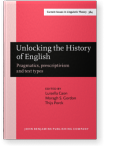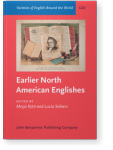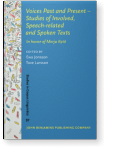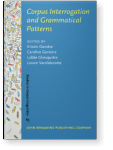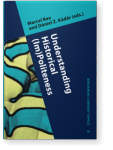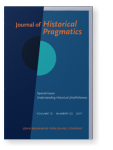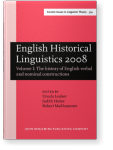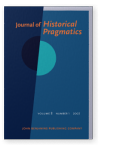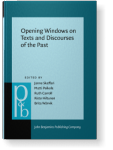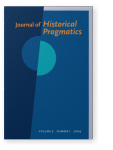Juhani Rudanko
List of John Benjamins publications for which Juhani Rudanko plays a role.
2024 A manipulative technique in a congressional debate: A case study from 1789 Unlocking the History of English: Pragmatics, prescriptivism and text types, Caon, Luisella, Moragh S. Gordon and Thijs Porck (eds.), pp. 86–100 | Chapter
This article examines a debate in the United States House of Representatives in 1789 and presents a case study of ad socordiam, which is shown to be an informal fallacy in the language of politics. This fallacy is based on inferences about covert intentions of speakers, depending in part on the… read more
2022 Grammar, text type, and diachrony as factors influencing complement choice in historical American English: choice in historical American English Earlier North American Englishes, Kytö, Merja and Lucia Siebers (eds.), pp. 123–146 | Chapter
A key task in the study of the system of English predicate complementation is to account for the variation between to infinitive and gerundial complements of verbs and adjectives in recent English. This chapter examines to infinitive and to ‑ing complements of the adjective accustomed, with data… read more
2020 Chapter 4. Revealing speech: Agentivity in Iago’s and Othello’s soliloquies Voices Past and Present - Studies of Involved, Speech-related and Spoken Texts: In honor of Merja Kytö, Jonsson, Ewa and Tove Larsson (eds.), pp. 47–62 | Chapter
In several of Shakespeare’s plays, soliloquies serve as a window into the speaker’s mind and a view of the world at the time of the soliloquy. The framework of analysis in this chapter is that of semantic roles, with the focus on the Agent. The author develops a view of the Agent based on a… read more
2014 A new angle on infinitival and of -ing complements of afraid, with evidence
from the TIME Corpus Corpus Interrogation and Grammatical Patterns, Davidse, Kristin, Caroline Gentens, Lobke Ghesquière and Lieven Vandelanotte (eds.), pp. 223–238 | Article
This article argues that an approach based on semantic roles offers a new approach to the variation between to infinitival and of -ing complements of the adjective afraid. While the semantic role of the higher subject does not appear to vary, control theory makes it possible to investigate the… read more
2014 Null objects and sentential complements, with evidence from the Corpus of Historical American English Corpus Interrogation and Grammatical Patterns, Davidse, Kristin, Caroline Gentens, Lobke Ghesquière and Lieven Vandelanotte (eds.), pp. 209–221 | Article
The present article discusses the occurrence of covert NP objects in object control structures with the matrix verb warn. The existence of such structures is at odds with Bach’s Generalization, which effectively states that the NP object in an object control structure may not be omitted. Evidence… read more
2012 “[T]his most unnecessary, unjust, and disgraceful war”: Attacks on the Madison Administration in Federalist newspapers during the War of 1812 Understanding Historical (Im)Politeness: Relational linguistic practice over time and across cultures, Bax, Marcel and Dániel Z. Kádár (eds.), pp. 81–102 | Article
This article focuses on face-threatening attacks on the Madison Administration during the War of 1812. The discussion is framed by the First Amendment to the United States Constitution, with the language of the Amendment protecting freedom of speech, and also by the Sedition Act of 1798, which, if… read more
2011 “[T]his most unnecessary, unjust, and disgraceful war”: Attacks on the Madison Administration in Federalist newspapers during the War of 1812 Understanding Historical (Im)Politeness, Bax, Marcel and Dániel Z. Kádár (eds.), pp. 82–103 | Article
This article focuses on face-threatening attacks on the Madison Administration during the War of 1812. The discussion is framed by the First Amendment to the United States Constitution, with the language of the Amendment protecting freedom of speech, and also by the Sedition Act of 1798, which, if… read more
2010 Tracking and explaining variation and change in the grammar of American English: A case study, with evidence from the TIME Corpus English Historical Linguistics 2008: Selected papers from the fifteenth International Conference on English Historical Linguistics (ICEHL 15), Munich, 24-30 August 2008., Lenker, Ursula, Judith Huber and Robert Mailhammer (eds.), pp. 29–44 | Chapter
Both to infinitive and to -ing complement clauses selected by adjectival heads may involve subject control in English, but there are syntactic differences between them. In spite of the differences, some matrix predicates have shown variation and change between the two types of sentential complement… read more
2007 Concepts for analyzing deception in discourse intended to be persuasive: Two case studies from Shakespearean drama Journal of Historical Pragmatics 8:1, pp. 109–126 | Article
The article examines two episodes from Shakespeare, one from Julius Caesar and the other one from Othello, in order to shed light on the nature of a type of deception often used by a speaker in discourse meant to persuade a hearer to adopt a particular course of action. Drawing on the episodes, two… read more
2005 Freedom of speech at stake: Fallacies in some political discourses in the Early Republic Opening Windows on Texts and Discourses of the Past, Skaffari, Janne, Matti Peikola, Ruth Carroll, Risto Hiltunen and Brita Wårvik (eds.), pp. 53–63 | Article
The article reviews the history of freedom of speech in the early American Republic and focuses on two speeches in the House of Representatives, one in the context of the Bill of Rights in 1789 and the other in the context of the Sedition Act in 1798. In the analysis of speeches it is helpful to… read more
2004 “I wol sterve”: Negotiating the issue of a lady’s consent in Chaucer’s poetry Journal of Historical Pragmatics 5:1, pp. 137–158 | Article
This study focuses on the construction of an amorous relationship in Chaucer’s poetry. It is observed that threats are recurring speech acts in Chaucer’s wooing scenes. Such threats are conditional and coercive in nature, having a bearing on the role and exercise of free will. A speech act… read more
